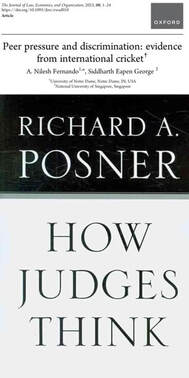
There is great clarity in the way in which Nilesh Fernando and Siddharth Eapen George examine the relationship between peer pressure and discrimination. The clarity is aided by their choice of ground. The authors take advantage of a 1994 change to the nationality requirements on the umpiring of international matches test matches that was not required for One Day Internationals. The difference is crucial.
The article reminds me of an argument made by Richard Posner in his book How Judges Think. Posner makes the point that American judges are appointed after a career in a related law field. He says that the “heterogeneity of the judiciary encourages a proliferation of varied insights and retards group polarisation”. Posner makes the point that judges are subject to external and internal constraints. The latter he links to judges wanting to be deemed a “good” judge by their peers.
Richard Posner distinguishes between the degree of discretion in judicial decisions. Nilesh Fernando and Siddharth Eapen George do likewise for the decisions made by cricket umpires. Leg-before-wicket, run out, stumping, and caught wicketkeeper decisions are classified as discretionary decisions. Non-discretionary decisions are bowled, hit wicket, and caught outfield. The reason for the distinction is that biases can be given greater freedom where there is greater discretion. Posner agrees.
The authors also examine the impact of senior colleagues and new pairings.
Posner claims that he made more efficient use of his time because he did not watch sports. However, in How Judges Think he does take issue with statements made by John Roberts in confirmation as Chief Justice of the Supreme Court. Roberts compared judges to baseball umpires. Posner identifies three types of baseball umpires. I would love to have seen Posner compare baseball umpires to other sports judges. Alas, he did not. I would also like to have seen him discuss the sports data, including that from baseball, that shows biases in decision making. My guess is that he would not be surprised by the results presented by Nilesh Fernando and Siddharth Eapen George.
 RSS Feed
RSS Feed